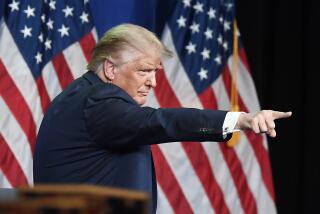Disenchanted Radicals Seek Change, May Split Party : Soviet Union: Reformers charge that Lenin’s legacy is a monolith. But some have second thoughts on leaving.
- Share via
MOSCOW — Natalia Dorokhina is a card-carrying member of the Communist Party of the Soviet Union. In a soft but steady voice, she speaks of Lenin as a “criminal” and says he was no lofty-minded revolutionary but the mastermind of a violent putsch that destroyed a legal government.
“When I came into the party, I did not know how much blood there was on its hands--so much blood,” lamented the 25-year-old mechanical engineer from central Russia, a member of the Democratic Platform, a fledgling radical wing inside the party.
Ideas like Dorokhina’s are why the party led by President Mikhail S. Gorbachev faces the first schism in its ranks since the early 1920s. Democratic Platform supporters, who have won 100 of the nearly 4,700 seats at the national Communist Party congress, said that, if their demands are not met, they will take as many as 500,000 rank-and-file Communists with them to form a new party.
The Democratic Platform reads like a litany of provocative political demands that once would have landed a Soviet citizen in prison, or worse. Claiming support from 40% of the party’s 18-million-member rank and file, platform authors want the congress to renounce communism as a goal, change the party’s name to delete “Communist,” which they say has been discredited by the party’s misdeeds, and enact internal reforms to end rigid centralization and make the party more democratic.
Radicals know they have no chance to push their views through a congress that, by weight of numbers, will be dominated by full-time state and party functionaries who have a stake in the status quo.
“The party is a monolith that cannot be reformed from within,” complained one Democratic Platform member, Mikhail Boikov. “I’ve lost patience.”
The Kremlin leadership, which recoiled in horror and seeming disgust after the faction was created six months ago, seems to be taking pains to be conciliatory now, evidently because Gorbachev and his allies are worried about the party’s now-resurgent conservative wing and would welcome a radical counterweight.
“I had thought the left-wing forces would be the ones to split the party,” Moscow party chief Yuri Prokofiev said recently. “This appeared to be a misconception. It turned out the conservatives were far more active.”
Vadim A. Medvedev, the No. 1 Communist ideologue, told reporters last week that party documents were recently retailored to take Democratic Platform views into account, in the interest of maintaining party unity. In April, Medvedev denounced the radicals as a “split-ist” faction and called it “amoral for a party card to be held by people who do not wish to have anything in common with the CPSU.”
Despite 11th-hour attempts by the Gorbachevian center to assure radicals that their opinions will help shape doctrine, Democratic Platform leaders were unmoved.
“What we have seen is a U-turn in the party’s policies toward conservatism,” said Prof. Vyacheslav Shostakovsky, rector of the Moscow Higher Party School. “We are now witnessing the decline into another type of authoritarianism.”
The political transformations sought by Shostakovsky and his comrades would be unrecognizable to V. I. Lenin, who forged the Communist Party into a secretive band of professional revolutionaries and, after the seizure of power in 1917, into a tightly controlled core of leaders for the new socialist society.
The Democratic Platform wants Lenin’s offspring to withdraw from the Soviet army, KGB and police, where it traditionally has exercised control, and to abrogate the official status that party committees have in factories, farms and offices.
Whatever the reformed party will be called should seek power only through multi-party elections, and exercise it only through government executive and legislative bodies, the Platform resolved in June. The party “should renounce communism as the objective of the Soviet Communist Party and proclaim as its goal the building of a democratic society on the principles of freedom, justice and solidarity,” it said.
Such revisionist language is guaranteed to make dyed-in-the-wool Marxist-Leninists livid.
“I expect nothing good from the party congress,” Dorokhina said last week.
Now, however, some of the Democratic Platform members say they are reconsidering their threat to leave the party, because they feel Gorbachev made some effort to accommodate their views in his opening-day report.
“It is important for us to come to the congress because of those millions of Communists who still do not understand the essence of the Soviet Communist Party,” Vladimir N. Lysenko, one of the Democratic Platform’s leaders, has said.
However, strains within the splinter group were evident before the congress was well into its second day. The more hotheaded Democratic Platform delegates were seeking an immediate walkout from the party, while their moderate comrades wanted to stay in the party for the duration of the congress or even beyond.
More to Read
Sign up for Essential California
The most important California stories and recommendations in your inbox every morning.
You may occasionally receive promotional content from the Los Angeles Times.













